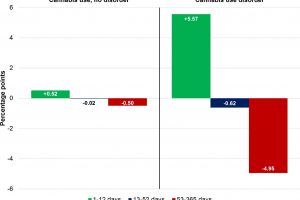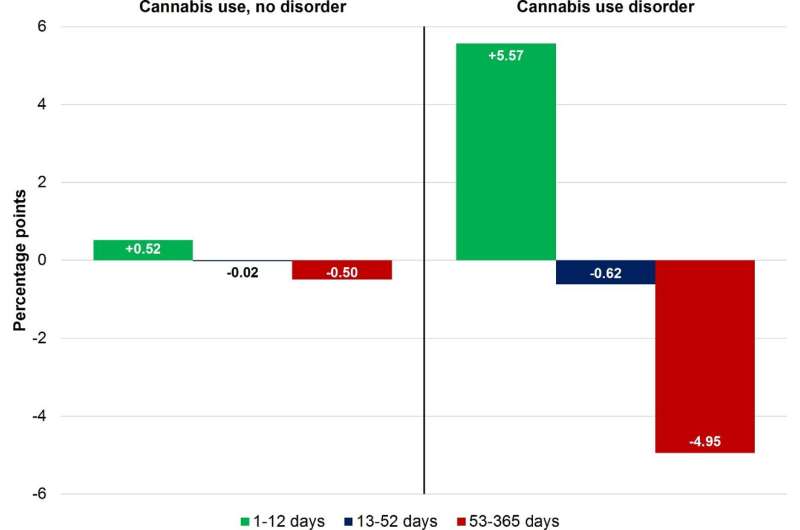States with legalized medical marijuana see decline in nonmedical opioid use


Medical cannabis legalization is associated with a decrease in the frequency of nonmedical prescription opioid use, according to a Rutgers study.
The study, published in the International Journal of Mental Health and Addiction, examined data from a nationally representative survey of adults who reported nonmedical prescription opioid use—or using prescription medications without a prescription or in a manner other than prescribed.
According to the study, when states implement medical cannabis laws, there is a 0.5 to 1.5 percentage point decrease in regular to frequent (up to or greater than once per week on average) nonmedical prescription opioid use among people who reported using opioids in the previous year. However, these reductions were concentrated in people who met diagnostic criteria for cannabis addiction.
Still, the pros of legalizing marijuana to address risky opioid use should be considered alongside the cons, according to Hillary Samples, faculty member at the Center for Pharmacoepidemiology and Treatment Science in the Rutgers Institute for Health, Health Care Policy and Aging Research and lead author of the study.
“There might be some benefits to allowing legal access to medical cannabis in the context of opioid-related harms,” Samples said. “However, from a policy perspective, there are much more effective interventions to address the ongoing overdose crisis, such as increasing access to treatment for opioid addiction.”
According to the Centers for Disease Control and Prevention, the rate of drug overdose deaths rose more than 14% from 2020 to 2021 in the United States. To understand approaches to mitigate this crisis, researchers have examined whether cannabis serves as an alternative to opioid use as cannabis might help with pain and symptoms of opioid withdrawal.
With existing research showing mixed findings on the relationship between medical cannabis legalization and opioid use, a team of researchers led by Samples sought to contribute to this evidence.
Samples, an assistant professor of health systems and policy at the Rutgers School of Public Health, said the results suggest people may be replacing opioids with cannabis, but because the decrease in opioid use is modest and limited to high-risk cannabis users, study researchers call for investment in opioid addiction treatment.
The researchers said future studies should seek to understand whether the reductions in the frequency of nonmedical opioid use are meaningful in relation to the widespread opioid addiction crisis as well as whether the reductions in opioid use coincide with increases in cannabis use disorder.
“Policymakers should weigh the overall evidence on the effectiveness of various approaches to reduce opioid-related problems and consider potential trade-offs,” Samples said.
More information:
Hillary Samples et al, Association Between Legal Access to Medical Cannabis and Frequency of Non-Medical Prescription Opioid Use Among U.S. Adults, International Journal of Mental Health and Addiction (2023). DOI: 10.1007/s11469-023-01191-y
Journal information:
International Journal of Mental Health and Addiction
Source: Read Full Article




